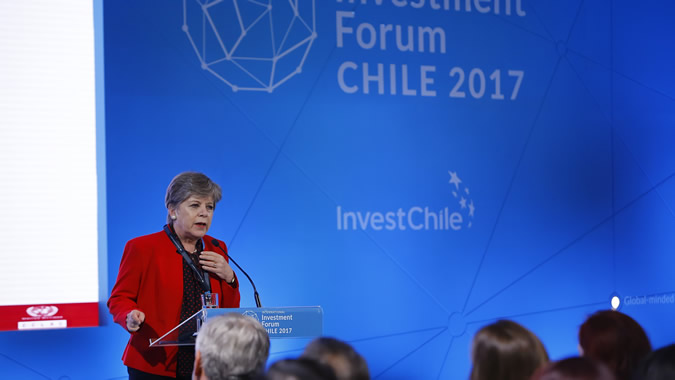Alicia Bárcena: “Foreign Direct Investment can contribute to achieving the 2030 Agenda for Sustainable Development”
Work area(s)
ECLAC’s Executive Secretary was one of the main speakers at the IV International Investment Forum Chile, inaugurated by the country’s president, Michelle Bachelet.

Foreign Direct Investment (FDI) has the potential to contribute to achieving the 2030 Agenda for Sustainable Development in Latin America and the Caribbean, developing strategic sectors and activities for the region such as infrastructure, digitalization and clean energies, Alicia Bárcena, the Executive Secretary of the Economic Commission for Latin America and the Caribbean (ECLAC), said on Tuesday during the IV International Investment Forum Chile, which took place at a hotel in Santiago.
“Our region hopes that FDI flows can contribute to productive diversification and innovation, to the development of new industries with less environmental impact and the creation of direct and indirect jobs, hand in hand with the 2030 Agenda for Sustainable Development being promoted by the United Nations,” the senior UN representative asserted at the event organized by InvestChile, the Foreign Investment Promotion Agency.
Bárcena was one of the main speakers at the forum inaugurated by Chilean President Michelle Bachelet and the Director of InvestChile, Carlos Álvarez, with the participation of the Ministers of Finance, Rodrigo Valdés, and of Economy, Development and Tourism, Luis Felipe Céspedes. She spoke to an audience made up of executives from foreign-owned companies seeking investment opportunities in the country and from companies already based in Chile.
“Latin America and the Caribbean must participate in the digital revolution to be competitive,” since the world is moving from a consumption-based Internet to an Internet based on consumption and production, Bárcena said. She added that “the Americas are digitalizing quickly, for that reason ECLAC has proposed establishing single digital markets at a subregional level that can utilize shared infrastructure.”
The complex current global scenario, Bárcena said, is characterized by significant geopolitical changes that are redefining the roles of world powers such as China, Europe and the United States. This comes on top of growing inequality, the emergence of the “fourth industrial revolution” focused on digitalization, threats such as climate change, and phenomena such as the demographic transition and migration.
As Bárcena indicated, global growth is still weak (2.2% in 2016), trade continues to decelerate, and FDI flows are stagnating. In this context, the economy of Latin America and the Caribbean contracted 1.1% last year, with disparate results among subregions, while in 2017 growth of just 1.3% is expected, she stated.
“We are especially worried about worsening social indicators due to the loss of jobs,” Bárcena said, adding that in 2016 regional exports declined for a fourth straight year, while Foreign Direct Investment toward Latin American and Caribbean countries fell 9% in 2015 and about 8% in 2016, according to ECLAC’s latest available data.
Although she praised the business environment in Chile, ECLAC’s Executive Secretary emphasized that in all of Latin America and the Caribbean challenges remain, such as to increase productivity and investment in research and development.
“Productivity in the region represents approximately 15% of the productivity of the United States and, while in 1990 Latin America and the Caribbean was responsible for 2% of the world’s patent applications, in 2014 that percentage remained unchanged, while China went from 1% to 35% in the same period,” she said.
The main challenge, she concluded, is to attract quality FDI, which would have an impact on innovation capital, align with national development plans and allow for building capacities in receiving countries.
Related content
Global trends and Foreign Direct Investment in Latin America
Presentación de Alicia Bárcena, Secretaria Ejecutiva de la CEPAL, durante el IV Foro Internacional de Inversiones de Chile.
Country(ies)
- Latin America and the Caribbean
Contact
Public Information Unit
- prensa@cepal.org
- (56 2) 2210 2040